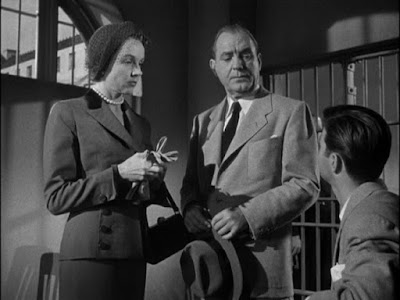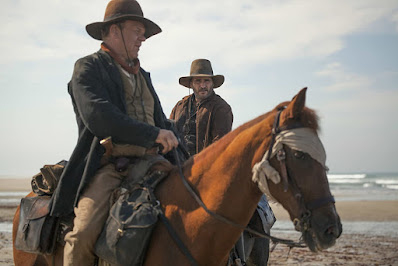THE THIEF
(1952)
By Ralph Santini - ***½
The criminally undervalued team of
filmmakers, Clarence Greene and Russell Rouse have made lots of often
overlooked rare gems and their speechless 1952 Film Noir title, The Thief, is
no exception. That’s right when you notice the word speechless I’m not even
joking. The film contains no dialogue at all but that doesn’t mean it contains
no sound. It contains plenty of compelling ringing on telephones and a very moving
scene at the near-end but I’ll get to that later. The minimal cast of this film
stars Ray Milland, Martin Gabel and the beautiful Rita Gam. Greene and Rouse
not only produced and directed the film, respectably, but they also co-wrote
this rather unique script together. It’s that genuinely interesting.
The story is about a Nuclear scientist, Dr. Phillips (magnificently portrayed by Milland) who decides to become a Spy for a gang of communist infiltrators led by Martin Gabel who secretly keeps sending private messages to Dr. Phillips concerning his mission to betray his country’s ideals. During the mission when Dr. Phillips delivers those messages it keeps passing to one different spy to another so that they can accomplish the mission. The biggest problem in this process however is that Dr. Phillips becomes so affected by the mission that he frequently becomes a heavy drinker and sometimes ignores some of Gabel’s callings on the telephone. Despite all that Gabel keeps watching Milland to make sure he doesn’t fail this mission.
Ray Milland later makes his tough
decision to go on with the purpose and then infiltrate a respected scientists’
office. Milland then photographs a good number of documents in the desk so he
can then continue transferring the films to other double agents in the mission.
The bad news is that when one of the double agents gets involved in a traffic
accident, the FBI quickly discovers this case and it’s up to them hunt
everybody involved in it, including Ray Milland himself. Afterwards Gabel
instructs Milland to go to New York in hiding from the FBI and his leader
suggests him get refuge in a low-rent apartment where he is aided by a sexy
femme fatale (Gam) involved in the case. Things don’t go well however when he
eventually is chased by an FBI agent and the results are going to be more risky
than ever.
The Thief, to be perfectly honest, is
truly underappreciated rare gem in it’s own right. It’s sometimes dismissed as
somewhat slow but I don’t think that bothers me in the case of this very good treasure.
I mean, come on, I don’t think you can go wrong with Ray Milland in many of his
forgotten vehicles because even if he lost his fame since the 1950s I can still
make sure he’s still got it. And this film really proves it. I really loved how
the film didn’t use one single line for this unique screenplay because I think it
helps it not to be too cliched nor routine. I really don’t want to give that
many spoilers but I think director Russell Rouse does an excellent job of using
the cast to make great emotions like for example Ray Milland crying and going
out his mind when he knows that the mission is actually failing miserably. There
are some shots when Milland sometimes has to go to the Library Of Congress as
part of his mission to give a lot of top secret information to communist spies that
would really give great impact on later spy works like The Spy Who Came In From
The Cold. And I really admire how the film gets so dark when the camera uses
it’s close ups to Martin Gabel looking really threatening and very stone-cold
with his earnest looks on his mean eyes.
The Thief is one of those rare gems
that don’t deserve it’s unfair obscurity and least needs a second look even you
see it the first time. Personally I’d recommend it with very little reserve and
lot of enthusiasm given the lack of dialogue the script has.






